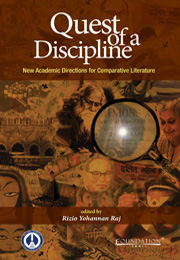Book contents
- Frontmatter
- Contents
- List of Contributors
- Acknowledgements
- Prologue to the “Quest'
- Introduction
- PART I Traditions and Manifestoes: Reflecting on Perspectives
- PART II The Quest Motif: Redefining the Scope of Comparative Literature
- PART III The Dynamics of Exchange: Genres, Areas and Disciplines
- PART IV India: A Curious Comparative Space
- Afterword: Comparative? Literature?
- Index
PART II - The Quest Motif: Redefining the Scope of Comparative Literature
Published online by Cambridge University Press: 05 June 2012
- Frontmatter
- Contents
- List of Contributors
- Acknowledgements
- Prologue to the “Quest'
- Introduction
- PART I Traditions and Manifestoes: Reflecting on Perspectives
- PART II The Quest Motif: Redefining the Scope of Comparative Literature
- PART III The Dynamics of Exchange: Genres, Areas and Disciplines
- PART IV India: A Curious Comparative Space
- Afterword: Comparative? Literature?
- Index
Summary
Many geographies across the world are fast becoming sites of intermingling cultures and overlapping languages. In this scenario, no contemporary scholarship can limit itself to a single discipline. This is especially true of a plurisignificant site such as ‘literature’. Literary scholars have always been open to engaging themselves with fields other than literature in order to gain greater insights into their own pursuit. The Humanities in general today rely a great deal on a scholar's expertise in theorising and on her ability to consider different arts and sciences concurrently. Specialists in literature today have begun to take active interest in the areas of Translation Studies, Performance Studies, Cultural Studies, Media Studies, Women's Studies, indigenous wisdom and other subjects under the broad scope of the Humanities and Social Sciences. This section seeks to privilege this intertextuality inherent to the rigorous pursuit of a literary scholar of our times. Here, experts like Julian Vigo and Meena T. Pillai argue that Comparative Literary Studies must engage far more robustly than it has ever done with various modes of representation available today. However, even as we open out our studies towards the full diversity of verbal, visual, and musical representations today, older comparative sites such as translation, folklore, performance et cetera continue to have an important place in our scheme of things. Today, Comparative Literature has devised a strategy of understanding literature in relation to various other epistemic and creative fields, thereby expanding its scope as never before.
- Type
- Chapter
- Information
- Quest of a DisciplineNew Academic Directions for Comparative Literature, pp. 61 - 62Publisher: Foundation BooksPrint publication year: 2012



